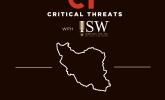Russian Offensive Campaign Assessment, December 6
December 6, 2022 - ISW Press
The Kremlin directly responded to Russian rumors of a second wave of mobilization in an apparent effort to manage growing societal concern and recentralize information about the war with the Russian government and its authorized outlets. Kremlin Press Secretary Dmitry Peskov on December 6 urged Russians to rely on communications from the Russian Ministry of Defense (MoD) and the president and to ignore the “provocative messages” published on social media platforms such as Telegram regarding a second wave of mobilization. Peskov’s statement is likely aimed at discrediting the growing influence of both Russian opposition and pro-war Telegram channels that have been consistently reporting on indicators of the Kremlin’s intention to resume mobilization in 2023. Russian President Vladimir Putin is also increasing measures to prevent mobilized men and their families from complaining about mobilization problems. Putin, for example, signed a law banning rallies in government buildings, universities, schools, hospitals, ports, train stations, churches, and airports—likely to suppress riots and protests among mobilized men and their families.







